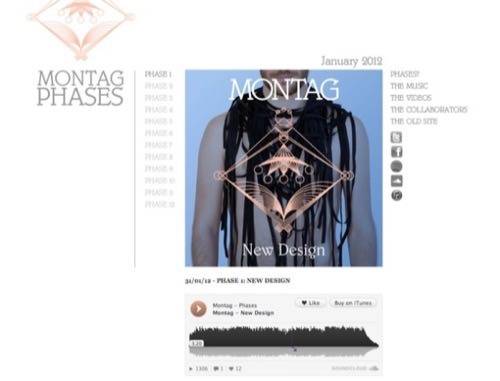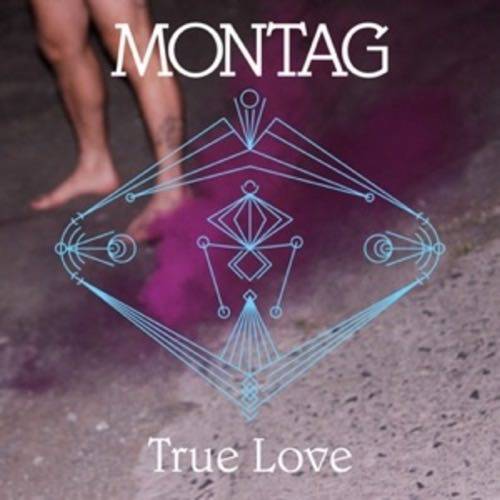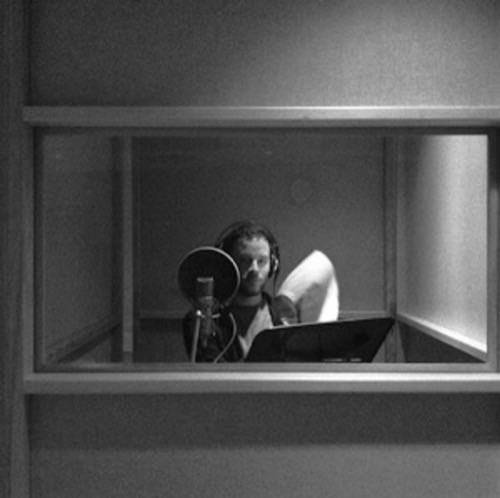
While listening to a Spotify playlist from music discovery service We Are Hunted, I came across an intriguing artist I hadn’t heard of before: Montag. I starred the song, called ‘True Love’, and a bit later went back to explore more of Montag’s music. It turns out he is in the middle of a project, called Phases, that is attempting to reimagine the album. Other musicians have experimented with the album format too over the past couple of years – most notably, Bjork with her “App Album” Biophilia. Like Bjork, Montag has broken up the album format into unique pieces. But his approach from there is quite different.
For Bjork, each song was an iOS app, with animation and gaming being as much a part of the album experience as the music. For Montag, it’s less about augmenting the music with multimedia and more about playing to the strengths of the Web – publishing songs without a middleman (a.k.a. a record company), explaining the components of each song (small pieces loosely joined!), collaborating with other artists, building a social connection with his listeners.
Montréal based Montag has committed to posting one song every month, over 2012. This enables the creative process to be more real-time than with a traditional album, because his songs will be released soon after he completes them. The title of his project is Phases, reflecting what he calls a “12-phase music project.”

There is one other key difference to a traditional album, but this is something that Montag could’ve easily chosen not to mess with. Most albums are a cohesive set of songs, with a common theme or sound. Every Bob Dylan album, for example, has a unique sound and is thematically different from his previous album. In Montag’s Phases, each song will have a different music style. So while he will end up with a set of 12 songs, his goal isn’t to create a cohesive album. Montag says this approach allows him “to be more spontaneous with each release [song].”
Montag’s Album That Isn’t An Album
So what exactly is Phases? So far he has released seven songs, up to and including July. Each song is posted to his website, using SoundCloud, accompanied by a blog post in which Montag explains the creative process. The post features an explanatory “audio documentary,” which includes sonic details on how the track was constructed. There is unique – and quite gorgeous – artwork for each song and five of the songs so far have videos. The action isn’t just on his website. Each “phase” is released on Spotify and iTunes (it’s free to listen to on Spotify and costs 99 cents per single in iTunes).

Montag himself is insisting this isn’t an album, but “a monthly singles project.” However, at the risk of incurring the artist’s wrath, I think it’s interesting to view this as an experimental album. There is a cohesiveness to his method, if not with the songs. So I wouldn’t be surprised if Montag changes his mind at the end of this project and releases it as an album!
The music itself is a mix between electronica and synth-pop and it’s a matter of personal taste whether you like the sound of it. Regardless, Montag’s project is to be commended for using the Web to push the boundaries of the album. It isn’t as ‘out there’ innovative as Bjork’s App Album, but in many ways it utilizes the Internet better.

Bjork involved the listener in the music by making her apps interactive – each song/app doubled as a game. However, as with traditional albums, there was still a distance between the artist and listener. You could play with Bjork’s music, but you couldn’t interact with the artist herself.
While Montag doesn’t open himself completely to his audience (comments are turned off on his website, for example), he does bring the listener into his world more. He explains the creative process for each song, which makes listening to it feel surprisingly intimate. He is also active on social media – in particular Facebook, Twitter and SoundCloud.
Pushing The Boundaries, Even More Than Radiohead
The Web has already disrupted how we listen to music (Spotify, Pandora) and buy it (iTunes). But up till now, on the production side, the innovations have been mostly around how music can be published and promoted (SoundCloud, Bandcamp). The actual formats of popular music, singles and albums, have so far not strayed too far from the norm. Even Radiohead, which has done a lot of experimentation with the Web, has continued to release traditional, thematically cohesive albums.
Artists like Bjork and Montag are beginning to test those boundaries now. It’s great to see – and hear!

















